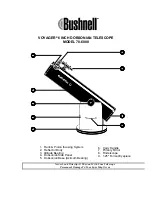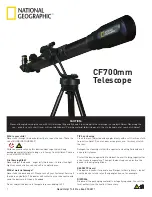
20
excessively bright. If the view through the filter is uncomfortable or excessively bright, stop using the filter
immediately!
Choose an observing site with a clear view of the sky and as close to the umbra shadow region as possible.
Often, people travel to locations where the solar eclipse will be most intense and weather will be clear.
Choose an observing location on grass and away from asphalt and concrete. Viewing over grass will reduce
the amount of heat currents seen and give a better image quality.
Use an eyepiece with low magnification, such as the 26mm eyepiece, so you can see the entire solar disk.
The solar eclipse can last several hours from start to finish so make sure you have sunblock, head covering
or shaded place where you can get out of the bright Sun when needed.
Check the weather! Nothing can spoil a solar eclipse like clouds or rain.
You can also observe the Sun with special Mylar solar glasses, which you can purchase from Meade or at
online retailers. The filters on these solar glasses are made of solar safe material, similar to that found on
the EclipseView solar filter. In addition to using your EclipseView Telescope there are also indirect ways to
view the Sun as well. A quick Google search will yield many different ideas. Just remember to never look
at or near the Sun without the proper solar filters!
Solar Filter Maintenance
:
The solar filter can be cleaned by using a soft micro-fiber cloth, soft brush, or soft blower. First, gently blow
off any dust that may accumulate on the filter from outside use. If the filter is still dirty than you may
19











































